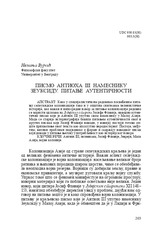Приказ основних података о документу
Pismo Antioha III namesniku Zeuksidu - pitanje autentičnosti
The question of authenticity of the Antiochus III letter to Zeuxis
| dc.creator | Vujčić, Nemanja | |
| dc.date.accessioned | 2021-10-12T11:23:33Z | |
| dc.date.available | 2021-10-12T11:23:33Z | |
| dc.date.issued | 2011 | |
| dc.identifier.issn | 1450-6998 | |
| dc.identifier.uri | http://reff.f.bg.ac.rs/handle/123456789/1289 | |
| dc.description.abstract | Kako u specijalističkim radovima posvećenim pitanju seleukidske kolonizacije tako i u opštim sintezama helenističke istorije, kao važan i neposredan izvor za pitanje kolonizacije redovno se koristi odlomak iz Judejskih starina Josifa Flavija, navodno autentično pismo koje je Antioh III uputio svom namesniku u Maloj Aziji. Mada se starija istoriografija bavila pitanjem autentičnosti ovog i drugih pisama koje Josif Flavije navodi, u novijoj postoji gotovo opšte prihvatanje ovog teksta kao apsolutno verodostojnog. Postoje, međutim, veliki problemi podjednako o formi i sadržaju navodnog pisma koji dovode u pitanje njegovu upotrebljivost kao istorijskog izvora. | sr |
| dc.description.abstract | There was much debate in the early 20th century historiography whether or not the letter quoted by Josephus in Antiquitates Iudaicae 12.148-153 is a genuine Hellenistic document. The more recent studies regard this letter as authentic with a remarkable degree of uniformity, usually without any attempt at careful analysis (Gauger's work being the only exception). As it stands, the letter could provide useful information on a number of important questions, including the history of the Seleucid military colonies, events of the reign of Antiochus III and the creation of the Jewish diaspora in Asia Minor, if only there were a hard proof that it is what it claims to be. But the more thorough reading reveals a great number of anomalies involving the text, including both its formal features and the contents. The alleged royal letter shows flaws and discrepancies that separate it from the other known epistulae of the same king. The expression king uses to refer to his subordinate ('father') is very unusual and at odds with the basic ideas of Hellenistic kingship. Another anomaly is the mention of royal 'friends' in such context, and also the fact that king refers to himself in singular, plural being the only form encountered in the other Seleucid royal letters. Contents of the letter also raise a number of questions that can hardly be reconciled with the current knowledge of the Hellenistic world. Great uprisings in Lydia and Phrygia are mentioned in the text but are otherwise unknown, which is very strange considering that we are generally very well informed about this period. Another point of doubt is that the instructions on an urgent matter are expected from the king, himself absent on a campaign in the eastern parts of the Empire, in spite the obvious fact that the governor Zeuxis had both means and the authority to deal with any possible challenge of the sort. The greatest problem with the alleged letter is the assumption that the military colonization is a method to quell the uprising; this is simply not the case. But the very purpose of the letter, viewed in the context of the Josephus work, is not to inform the reader about this or any other measure of the Seleucid government, but rather to prove that Jews were held in high esteem by Antiochus III and the other rulers of his dynasty. This also explains the choice of Babylonian Jews as military settlers, otherwise unprecedented in Hellenistic world outside Palestine itself. This and other problems with both external and internal features of the document clearly point that we are dealing with a later forgery, perhaps as late as the final quarter of the 1st century AD. Josephus was probably not the author of the forgery, more likely he found it in the one of his sources. It seems that so far, the letters and other documents quoted by Josephus did not receive the amount of critical examination that is standard in the classical scholarship. | en |
| dc.publisher | Matica srpska - Odeljenje za književnost i jezik, Novi Sad | |
| dc.rights | openAccess | |
| dc.source | Zbornik Matice srpske za klasične studije | |
| dc.subject | vojne kolonije | sr |
| dc.subject | Mala Azija | sr |
| dc.subject | Josif Flavije | sr |
| dc.subject | Jevreji | sr |
| dc.subject | helenizam | sr |
| dc.subject | Antioh III | sr |
| dc.title | Pismo Antioha III namesniku Zeuksidu - pitanje autentičnosti | sr |
| dc.title | The question of authenticity of the Antiochus III letter to Zeuxis | en |
| dc.type | contributionToPeriodical | |
| dc.rights.license | ARR | |
| dc.citation.epage | 219 | |
| dc.citation.issue | 13 | |
| dc.citation.other | (13): 203-219 | |
| dc.citation.spage | 203 | |
| dc.identifier.fulltext | http://reff.f.bg.ac.rs/bitstream/id/267/1286.pdf | |
| dc.identifier.rcub | https://hdl.handle.net/21.15107/rcub_reff_1289 | |
| dc.type.version | publishedVersion |

